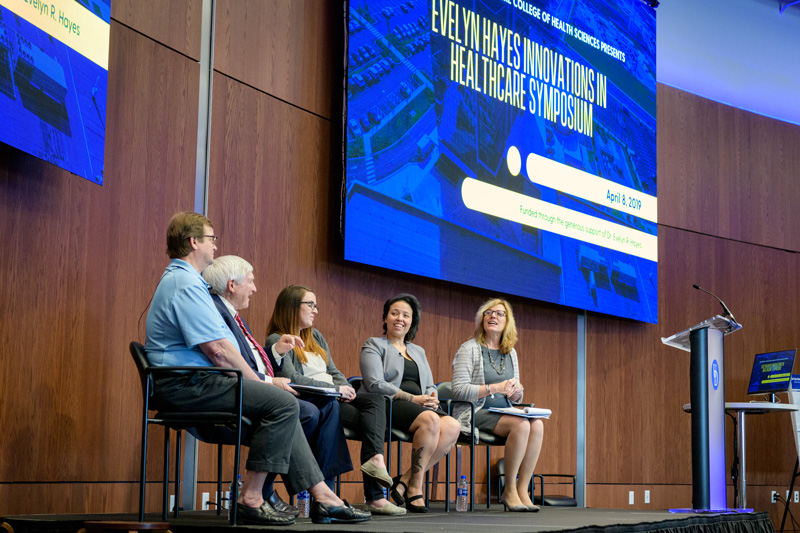


Moving beyond stigma
Photos by Evan Krape May 10, 2019
Experts gather to discuss Delaware’s substance abuse and mental health challenges
Delaware is among the states feeling the biggest impact of the public health crisis of substance abuse and mental health disorders. More than 30,000 adults, 9,000 adolescents and 82 percent of the prison population in Delaware are estimated to suffer with mental illness or drug addiction. In 2018, there were more than 400 overdose deaths in Delaware, up 45 percent from 2017, according to state statistics.
"Every 22 hours someone is dying from an opioid death overdose," Delaware Lt. Gov. Bethany Hall-Long told an audience in the University of Delaware’s Tower at STAR Audion for the April 2019 Evelyn Hayes Innovations in Healthcare Symposium. (Long is also a nursing professor at UD.) The discussion title was, "Substance Abuse and Addiction: Looking at the Current Landscape and Envisioning the Future Through Different Lenses." Experts offered details during two panel discussions.
One of the biggest hurdles, panelists agreed, is the stigma, which affects the person with addiction and their loved ones.
"Stigma keeps people from getting treatment. You need to provide opportunities for those who need it," said Don Keister, founder of AtTAcK Addiction, whose son, Tyler, died from an accidental overdose. "It has to be immediate and have a number of levels. It needs a continuum of care. I think people are trying to work toward that. But we're still not getting the word out to the people who need the word."
Panelists also agreed there is a need for more mental health services, since 45 percent of people with addiction also have a co-occurring mental health health disorder, according to the 2017 National Survey on Drug Use and Health by the federal Substance Abuse and Mental Health Services Administration. In Delaware, students are struggling with mental health and behavioral health issues at earlier ages, said Michele Marinucci, senior director of pupil services for the Christina School District.
Sandy Gibney, an emergency room doctor at St. Francis Hospital in Wilmington, said the culture changed within her department in recent years. Along with prescribing fewer opioid medications, there's a focus on being less punitive and providing more medical help to those in active addiction — just like they treat patients with a chronic disease such as diabetes. Also, the state's use of the OpenBeds platform, which makes available the number and location of available treatment beds in the state, has helped emergency providers get more people into addiction treatment.
"Once they get to the ER, we should work to get folks into treatment, make them feel welcome, make them feel like there's help," said Gibney, a UD alum who also goes out in a mobile health van to bring needed medical care to the community. "Moving forward, we have so many opportunities outside the [emergency department] in the hospital environment. If they have abscesses, bacterial infections, we want them to be treated appropriately while they are hospital patients."
Joshua Thomas, executive director of the National Alliance on Mental Illness in Delaware, said another challenge for people in recovery is finding employment that will allow them to be stable members of the community. Thomas said there has been talk of creating a resource fair to help connect people in recovery with employers who are willing to hire them.
"People in recovery need to be able to get back to work,” Thomas said. “They need some help in how to have a conversation with a potential employer. Maybe they have an employment gap. We need to talk about building relationships with potential employers."
Stephanie King, who is now in long-term recovery, said she was a UD student when she was prescribed opiates while recovering from a stomach ailment. That started an addiction that eventually led her to heroin. She now works as a peer-recovery counselor and has seen just how devastating this epidemic has become.
“We are human beings. We’re not just homeless people in the streets. We need help,” said King, 29. “People out here my age are suffering. We are forgotten because we are dying.”
Evelyn Hayes Innovations in Healthcare Symposium
The April 2019 event was a follow-up to the Hayes Symposium held last fall featuring Dr. Karyl Rattay, director of the Delaware Division of Public Health, and Matt Denn, then attorney general of the state. The pair discussed addiction through a public health and legal perspective.
This time, panelists discussed some of the challenges facing those in recovery from substance use disorder, including a lack of available treatment beds in the state, barriers to employment and the need for additional funding for prevention, intervention and post-treatment.
Delaware Lt. Gov. Bethany Hall-Long moderated the first panel discussion, which included Dr. Sandy Gibney, an emergency doctor at St. Francis Hospital in Wilmington; Joshua Thomas, executive director of NAMI Delaware; Tamera Fair, executive director of the Wilmington HOPE Commission; Michele Marinucci, senior director of pupil services for the Christina School District; and Carolyn Petrak, associate executive director of the Ability Network of Delaware. The second panel was moderated by Rita Landgraf, director of the Partnership for Health Communities and former secretary of the Delaware Department of Health and Social Services. It featured Don Keister, founder of AtTAcK Addiction; Stephanie King, a certified peer recovery specialist; Domenica Personti CEO of Recovery Centers of America at Bracebridge Hall; and Dave Humes, a father who lost his son, Greg, to an accidental overdose and has advocated for public policy changes to help people battling addiction.
Contact Us
Have a UDaily story idea?
Contact us at ocm@udel.edu
Members of the press
Contact us at 302-831-NEWS or visit the Media Relations website

